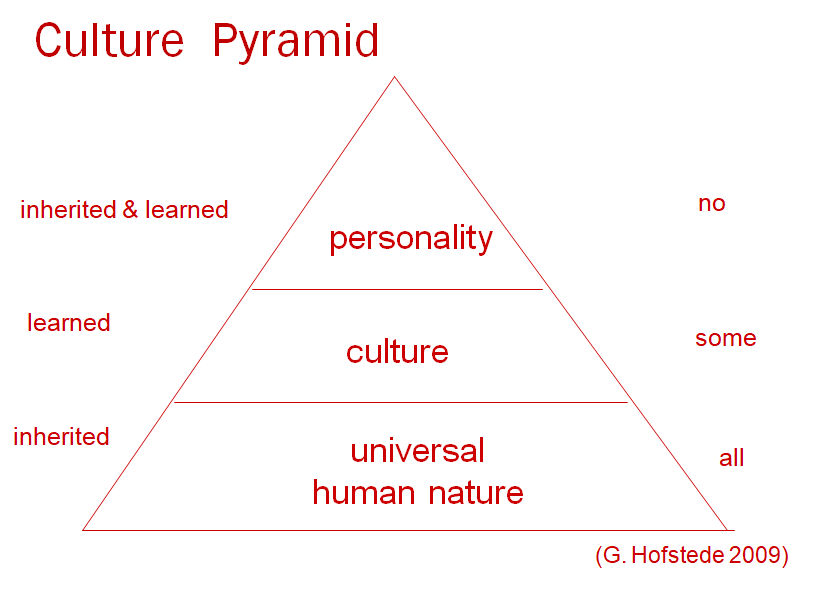2.1 Culture as Collective Identity(ies)
Culture as a Collective Phenomenon
In their book „Lokales Denken, globales Handeln“ (2009, 4th edition, p. 4), Geert Hofstede and Gert Jan Hofstede write that culture is always a collective phenomenon, since one shares it, at least in part, with people who live or have lived in the same social environment, i.e. where this culture was learned. Accordingly, they distinguish three levels: personality, culture and human nature.

Human nature is inherited and comprises of what is common to all people. Culture, on the other hand, according to the model, is learned and shaped by our social environment. Culture is therefore what we share with some people (e.g. groups, companies, universities, ethnic groups, nation states). Personality, on the other hand, is a very individual combination of what we have learned and inherited, which we do not share with anyone else. However, the three areas are closely connected. An example to illustrate this might be: All people share the ability to communicate through language (human nature), but only some people speak German (culture) and each person has a very personal way of speaking, e.g. choice of words, dialect, pauses in speech, … (personality).
So there are many cultures worldwide whose boundaries are blurred. Cultures consist of a multitude of subcultures. Individuals, however, are not part of one culture, but rather members of different cultures – at the same time. In this respect, cultural affiliations shape individuals and, conversely, individuals can influence and change cultures.
Exercise: „I am …“
Task
Complete the sentence “I am…” by writing as many characteristics, attributes, affiliations or adjectives as you can think of in the backpack.

Reflection
Task
Which of the terms are self-chosen? Which ones did someone attribute to you at some point? Which attributes do you particularly like? Which ones would you prefer to change? With regard to which of the attributes are you rather privileged at the German university? In relation to which ones are you rather disadvantaged?
Video on Collective Identity
Watch the following video on collective identity. Summarize the central statements in keywords. Reflect on which collective identities you embody.
Quiz: Basic Terms
Task
Do you already know these basic terms on Cross-Cultural Communication? Test your knowledge. Drag & drop the matching definitions to the respective terms.
Source: IKUD Seminare (o. J.): Multikulturalität, Interkulturalität, Transkulturalität und Plurikulturalität, in the Internet: https://www.ikud.de/glossar/multikulturalitaet-interkulturalitaet-transkulturalitaet-und-plurikulturalitaet.html, status: 06.07.
Next module section: 2.2 Culture and Reentry Shock